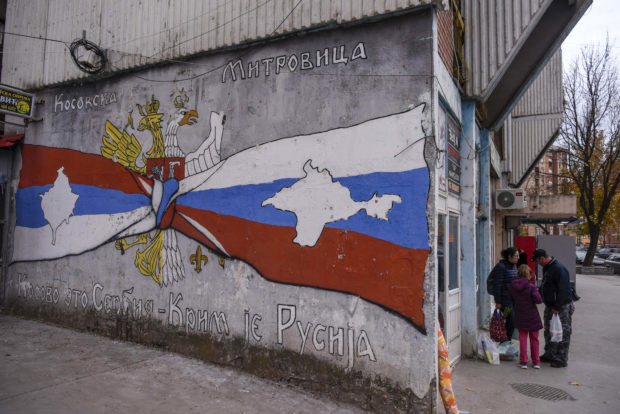
Kosovo Serbs stand next to a mural reading “Kosovo is Serbia and Crimea is Russia” in the Serb majority north of Mitrovica, on November 9, 2021. – In Kosovo’s Mitrovica, Serbian flags and nationalist murals blanket the streets of its Serb enclave — where the community effectively oversees a state within a state amid a deeply divided city that has long served as a flashpoint. For the past two decades, Mitrovica has straddled a simmering fault line between Kosovo and Serbia, where NATO patrols help oversee an uneasy peace and the Ibar River effectively partitions its Serb and Albanian communities. (Photo by Armend NIMANI / AFP)
PRISTINA — Kosovo lawmakers on Saturday banned the holding on its territory of a referendum being organized in Serbia — but did allow Kosovo Serbians to vote by mail.
Serbia is to hold a nationwide referendum Sunday on changes to the constitution that the government says would strengthen the independence of the country’s judiciary.
These reforms constitute one of the key conditions for the Balkan country’s bid to join the European Union.
Western nations have welcomed the referendum, encouraging all Serbian nationals to take part in it.
In a joint statement Friday, the United States, Britain, Germany, France, Italy and the EU urged the Kosovo government to “allow ethnic Serbs to exercise their right to vote in elections and electoral processes”.
But a resolution adopted by 76 MPs in the 120-seat Kosovo assembly said that holding a referendum of a foreign state “violates the constitution and sovereignty of Kosovo”.
Kosovo is not allowing polling stations for the referendum on its territory, and on Friday, Kosovo police stopped two trucks with ballots from Serbia from entering Kosovo.
But Kosovo Prime Minister Albin Kurti has said that ethnic Serbs can still vote, either by mail or at Serbia’s liaison office in Pristina.
Ethnic-majority Albanian Kosovo proclaimed independence from Serbia in 2008, a move that Belgrade still refuses to recognize.
It maintains strong ties with some 120,000 Kosovo Serbs, most of whom refuse to accept the authority of Pristina.
Tensions between Serbia and Kosovo have remained high since the 1998-1999 war between ethnic Albanian guerrilla and Serbian forces, in which about 13,000 people were killed, mostly ethnic Albanians.
But a key element of both Serbia’s and Kosovo’s EU membership aspirations is the requirement that they normalize their relations.
Kosovo is already recognized by roughly 100 states, including the US and most EU countries.